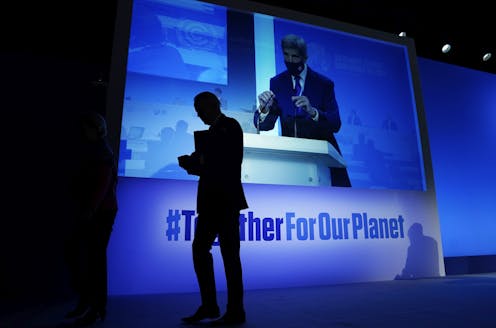The new Global Methane Pledge can buy time while the world drastically reduces fossil fuel use
- Written by Jeff Nesbit, Research Affiliate, Yale Program on Climate Change Communications, Yale University

There were four big announcements during the first week of COP26, the U.N. climate conference in Glasgow: on coal[1], finance[2], methane[3] and deforestation[4]. Of those four, the global methane pledge could have the most immediate impact on Earth’s climate – provided countries follow through on their pledges and satellite monitoring works as effectively as advertised.
More than 100 countries agreed to cut their methane emissions 30% by 2030[5] under the Global Methane Pledge, an initiative launched by the U.S. and European Union. And major foundations and philanthropic groups pledged over US$325 million[6] to help countries and industry dramatically reduce methane emissions from multiple sources.
Methane is about 84 times more powerful[7] at warming the climate than carbon dioxide over the short term. Since it only stays in the atmosphere for about 12 years[8], compared to hundreds of years for carbon dioxide, reducing the amount of methane human activities are adding to the atmosphere can have a quick impact on global warming.
A 30% cut in methane emissions could reduce projected warming by 0.2 degrees Celsius[9] (0.36 F), according to European Union estimates. That buys some time while countries are lowering their harder-to-cut carbon dioxide emissions, but it doesn’t mean other efforts can slow down.
How big of an impact could the pledge have?
The increase in methane emissions is driven by three anthropogenic sources: leaks from fossil fuel infrastructure – methane is the primary component of natural gas and can leak from natural gas pipelines, drilling operations and coal mines – and also from agriculture, primarily livestock and rice fields, and from decaying waste in landfills. The technology exists[10] to locate and stop the leaks from pipelines and oil and gas operations, and many landfills already make money by capturing methane[11] for use as fuel.
Several recent analyses show the immense potential of the methane pledge to slow warming. In May 2021 the Climate and Clean Air Coalition and U.N. Environment Programme released the Global Methane Assessment[12], a landmark report that describes how reducing methane can change the climate trajectory within the next 20 years – a critical time frame for slowing warming enough to avoid passing dangerous tipping points. The Intergovernmental Panel on Climate Change’s Sixth Assessment Report[13] concluded in August 2021 that methane mitigation has the greatest potential to slow warming over the next 20 years.
Human-caused methane emissions are growing at an alarming rate. Data released[14] by the U.S. National Oceanic and Atmospheric Administration in 2021 shows global methane emissions surged in 2020. Over the last decade methane emissions have reached five-year growth rates not seen since the 1980s.
An ambitious start
So, can the new global methane pledge work in time to help governments and industry limit global warming to 1.5 degrees C in the next two decades?
In short: yes, it can.
The Global Methane Assessment[15] determined that global human-driven methane emissions should be reduced by between 130 and 230 megatons per year by 2030 to be consistent with the Paris climate agreement goal of keeping global warming under 1.5 C compared to pre-industrial times. The Global Methane Pledge announced at COP26 would achieve approximately 145 megatons in annual reductions in 2030, an estimate extrapolated from the International Energy Agency’s methane tracking reports[16].
The Biden administration has proposed sweeping new rules[17] on methane emissions, particularly targeting oil and gas operations, to help reach its target. Missing from the pledge’s signers, however, are some large methane emitters, including China and Russia.
I worked[18] in both the George W. Bush and Barack Obama administrations and have been involved in climate change issues for several years. I see the pledge as a strong first step as the first-ever global commitment to specifically reduce global methane emissions.
The 30% goal serves as an ambitious floor to start from while countries get better at reducing methane and technologies improve.
Read more: Reducing methane is crucial for protecting climate and health, and it can pay for itself – so why aren't more companies doing it?[19]
References
- ^ coal (theconversation.com)
- ^ finance (www.gfanzero.com)
- ^ methane (ec.europa.eu)
- ^ deforestation (theconversation.com)
- ^ cut their methane emissions 30% by 2030 (ec.europa.eu)
- ^ foundations and philanthropic groups pledged over US$325 million (hewlett.org)
- ^ 84 times more powerful (unece.org)
- ^ about 12 years (www.epa.gov)
- ^ 0.2 degrees Celsius (ec.europa.eu)
- ^ technology exists (rhg.com)
- ^ capturing methane (www.iea.org)
- ^ Global Methane Assessment (www.ccacoalition.org)
- ^ Intergovernmental Panel on Climate Change’s Sixth Assessment Report (www.ipcc.ch)
- ^ Data released (research.noaa.gov)
- ^ Global Methane Assessment (www.ccacoalition.org)
- ^ methane tracking reports (www.iea.org)
- ^ sweeping new rules (www.whitehouse.gov)
- ^ I worked (climatecommunication.yale.edu)
- ^ Reducing methane is crucial for protecting climate and health, and it can pay for itself – so why aren't more companies doing it? (theconversation.com)
- ^ Read more of our U.S. (theconversation.com)
- ^ global coverage (page.theconversation.com)

















